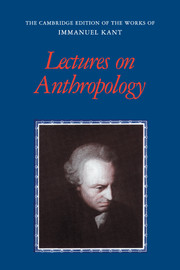Book contents
- Frontmatter
- Contents
- General editors’ preface
- Preface
- Abbreviations
- General introduction
- Anthropology Collins 1772–1773
- Anthropology Parow 1772–1773
- Anthropology Friedländer 1775–1776
- Anthropology Pillau 1777–1778
- Menschenkunde (1781–1782?)
- Translator's introduction
- Lecture of the Winter Semester 1781/82 [?] based on the transcriptions Menschenkunde, Petersburg
- Anthropology Mrongovius (1784–1785)
- Anthropology Busolt, 1788–1789
- Editorial notes
- Glossary
- Bibliography
- Index
- References
Translator's introduction
Published online by Cambridge University Press: 05 April 2013
- Frontmatter
- Contents
- General editors’ preface
- Preface
- Abbreviations
- General introduction
- Anthropology Collins 1772–1773
- Anthropology Parow 1772–1773
- Anthropology Friedländer 1775–1776
- Anthropology Pillau 1777–1778
- Menschenkunde (1781–1782?)
- Translator's introduction
- Lecture of the Winter Semester 1781/82 [?] based on the transcriptions Menschenkunde, Petersburg
- Anthropology Mrongovius (1784–1785)
- Anthropology Busolt, 1788–1789
- Editorial notes
- Glossary
- Bibliography
- Index
- References
Summary
The Menschenkunde transcription is unique among all of the anthropology transcriptions included in this volume in that it was not first published in 1997 as part of volume 25 of the Academy Edition of Kant's gesammelte Schriften. Rather, as Allen Wood notes in his General Introduction, it was first published in 1831, under the title Immanuel Kant's Menschenkunde oder philosophische Anthropologie. Nach handschriftlichen Vorlesungen herausgegeben von Fr. Ch. Starke (Leipzig: Die Expedition des europaischen Aufsehers, 1831). A new edition (neue Ausgabe) followed in 1838 (Quedlinburg und Leipzig: Verlag der Ernst'schen Buchhandlung, 1838). “Fr. Ch. [= Friedrich Christian] Starke,” the editor, was a pseudonym for Johann Adam Bergk. Bergk (1769–1834), who was born in Hainichen and died in Leipzig, was professor of philosophy and jurisprudence at the University of Leipzig, and also a prolific author, editor, translator, and publisher whose works appeared not only under his own name, but also under the pseudonym Fr. Ch. Starke, and at least two additional pseudonyms: Dr. Heinichen and Justus Freimund. Among Bergk's own works are a defense of the French revolution (Untersuchungen aus dem Natur-, Staats- und Volkserrechte, mit einer Kritik der neuesten Konstitution der franzosischen Republik [1796]), a treatise on punishment (Die philosophie des peinlichen rechtes [Meissen, 1802]), a monograph on critical reading (Die Kunst, Bucher zu lesen [Jena, 1799]), and two commentaries on Kant's Metaphysiscs of Morals (Briefe über Immanuel Kant's Metaphysische Anfangsgründe der Rechtslehre, enthaltend Erläuterungen, Prüfung und Einwürfe [Leipzig, 1797], Reflexionen über I. Kant's Metaphysische Anfangsgründe der Tugendlehre [Gera, 1798]).
Information
- Type
- Chapter
- Information
- Lectures on Anthropology , pp. 283 - 288Publisher: Cambridge University PressPrint publication year: 2012
References
Accessibility standard: Unknown
Why this information is here
This section outlines the accessibility features of this content - including support for screen readers, full keyboard navigation and high-contrast display options. This may not be relevant for you.Accessibility Information
- 2
- Cited by
